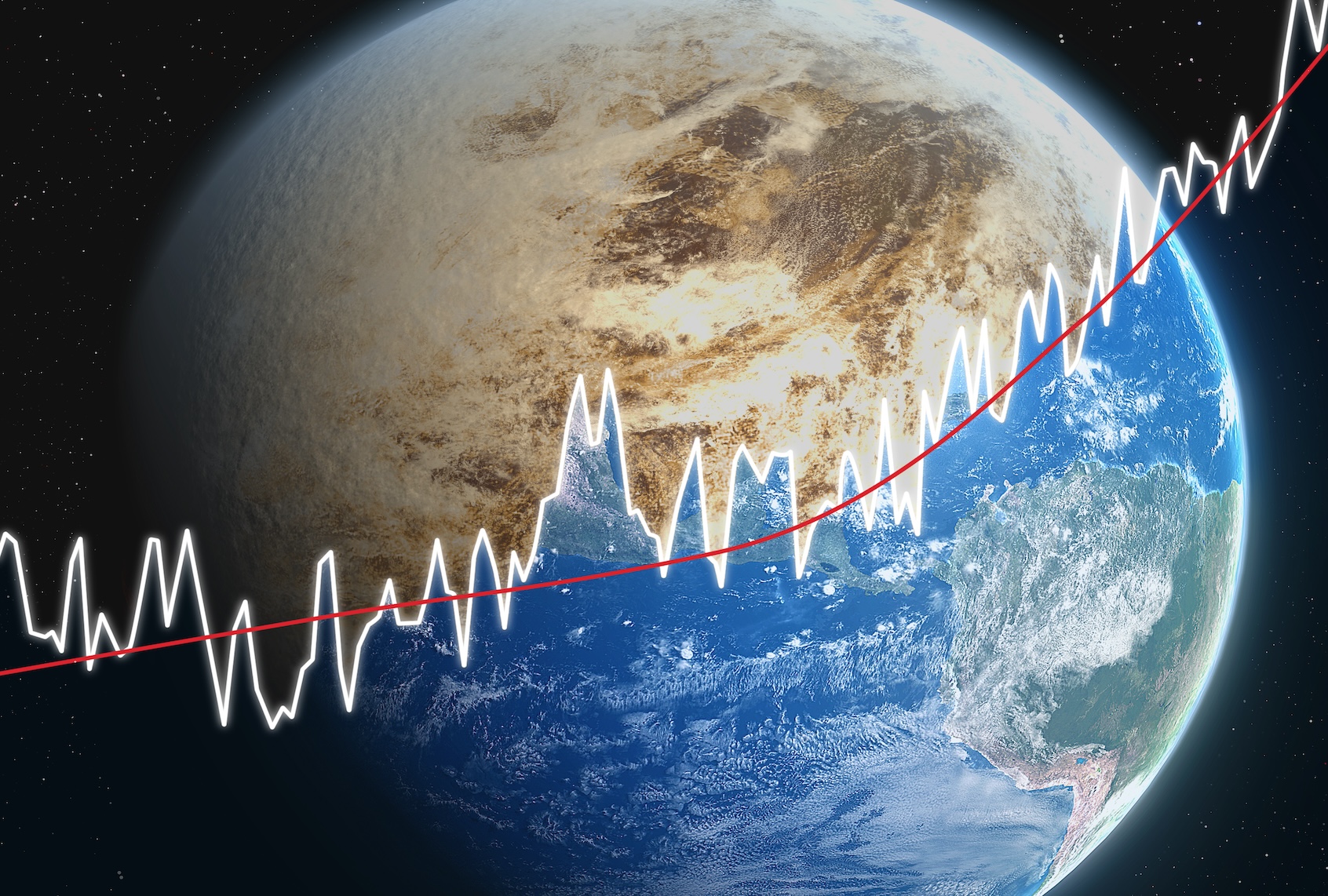If you knew your home would burn down exactly one year from today, you’d take immediate action. You’d clear out flammable clutter, upgrade alarms, and perhaps install fireproof doors or sprinklers. You’d also prepare for the worst — updating insurance, setting aside savings, and making an evacuation plan.
The human brain responds best to threats when they are clear, and certain. That unfortunate truth helps explain why we’re struggling to take action on climate change. Despite broad scientific consensus and growing certainty that the climate crisis will continue to worsen, there’s no way of predicting how or where it will strike. Knowing the exact dates and locations of disasters may not make it any easier to prevent — but it would likely spur decisive action.
Remember Y2K, the impending doom that would befall us all when ill-equipped computer systems switched from “99” to “00” at the stroke of midnight on December 31, 1999? The threat didn’t materialize, and not because it wasn’t real. It had a deadline, and the world’s governments and companies invested some $300 to $500 billion in upgrading computer systems and critical infrastructure to avoid it.
The problem with climate change, and the floods, droughts, hurricanes and fires that come with it: the threats are only going to get more frequent and more intense, but they are, by their very nature, erratic. As carbon dioxide crowds the Earth’s atmosphere, the planet not only warms but also generates weather systems that increasingly behave in unstable and unprecedented ways. “Unpredictability” will be a predictable weather watchword throughout all of our lifetimes.
We can never actually achieve total certitude about the shapes climate change will take, nor do we need to arrive at certitude to take action.
It is precisely this uncertainty that makes the climate crisis so costly and even deadly. While many impacts are predictable, the exact form disasters will take remains unknown — complicating insurance and disaster preparedness. Earlier this year, fires hit Los Angeles. Next, it could be Palo Alto, Phoenix or any number of equally vulnerable cities and suburbs, just as science long warned.
All that leads to a straightforward messaging problem with anything but an easy answer: Over the decades, climate scientists have been striving to improve on their ability to be “certain” about the causes and impacts of climate change. (For their part, IPCC reports have steadily dialed their declarations up on their own likelihood scale, achieving the holy grail of “virtually certain” for many key conclusions.)
But that all-too-human desire to close in on perfect certainty is causing us to miss an important point: We can never actually achieve total certitude about the shapes climate change will take, nor do we need to arrive at certitude to take action.
Nobody takes out insurance because they know their home will burn down with certainty. In fact, no insurance company would offer such an insurance policy in the first place. Every investor, actuary or corporate risk manager understands that it is the element of not knowing that creates the impetus to invest in mitigating risks and adapting to those that remain.
Climate change is no different. Scientists have provided conclusive links between us burning fossil fuels and any number of impacts, from more intense floods and fires to lower student test scores and worker productivity on the one hand, and lower life spans and home prices on the other. All told, the social costs for each ton of carbon dioxide burned by now add up to numbers in the high $200s, with a wide range that is heavily skewed toward much larger costs. Providing such a range is anything but an “admission” of some kind, or a call to “wait and see” before we can be more certain.
We need your help to stay independent
Climate deniers often point to the unanswered — or unanswerable — questions about climate change and insist those are good reasons to wait, to second-guess, to preserve the status quo. Take Russell Vought, the head of the Office of Management and Budget, who was pushing for the next version of the National Climate Assessment to include more “diverse viewpoints,” as Project 2025 puts it, before the Assessment was all but cancelled this week. A phrase like "diverse viewpoints" sets off warning bells for many climate scientists, pointing to the transparent effort to continue to foment confusion about the causes and impacts of climate change.
The uncertainty that is baked into this crisis is all the more reason to take urgent and decisive action to address it.
It’s nothing new: for decades now, uncertainty has been leveraged by those with an economic stake in the fossil fuel-powered status quo. In response, it’s tempting for us, as scientists, to point to all of the “virtual certainties” in our bodies of work, to insist that yes, we do know what the future holds for the climate.
When we get locked into this back-and-forth, we overlook something crucial: the uncertainty that is baked into this crisis is all the more reason to take urgent and decisive action to address it.
Scientists should not be afraid to acknowledge what’s unknowable about the future before us. Perhaps, if we humbly accept this uncertainty, and in fact, trumpet it as a reason to mobilize around rapid decarbonization, we can repurpose uncertainty from the barrier to climate progress that it’s long been into a benevolent cudgel on the side of spurring climate action.
Let’s finally acknowledge how much we don’t know, and from that new point of departure, do everything we can to save our home.
Read more
about climate change


